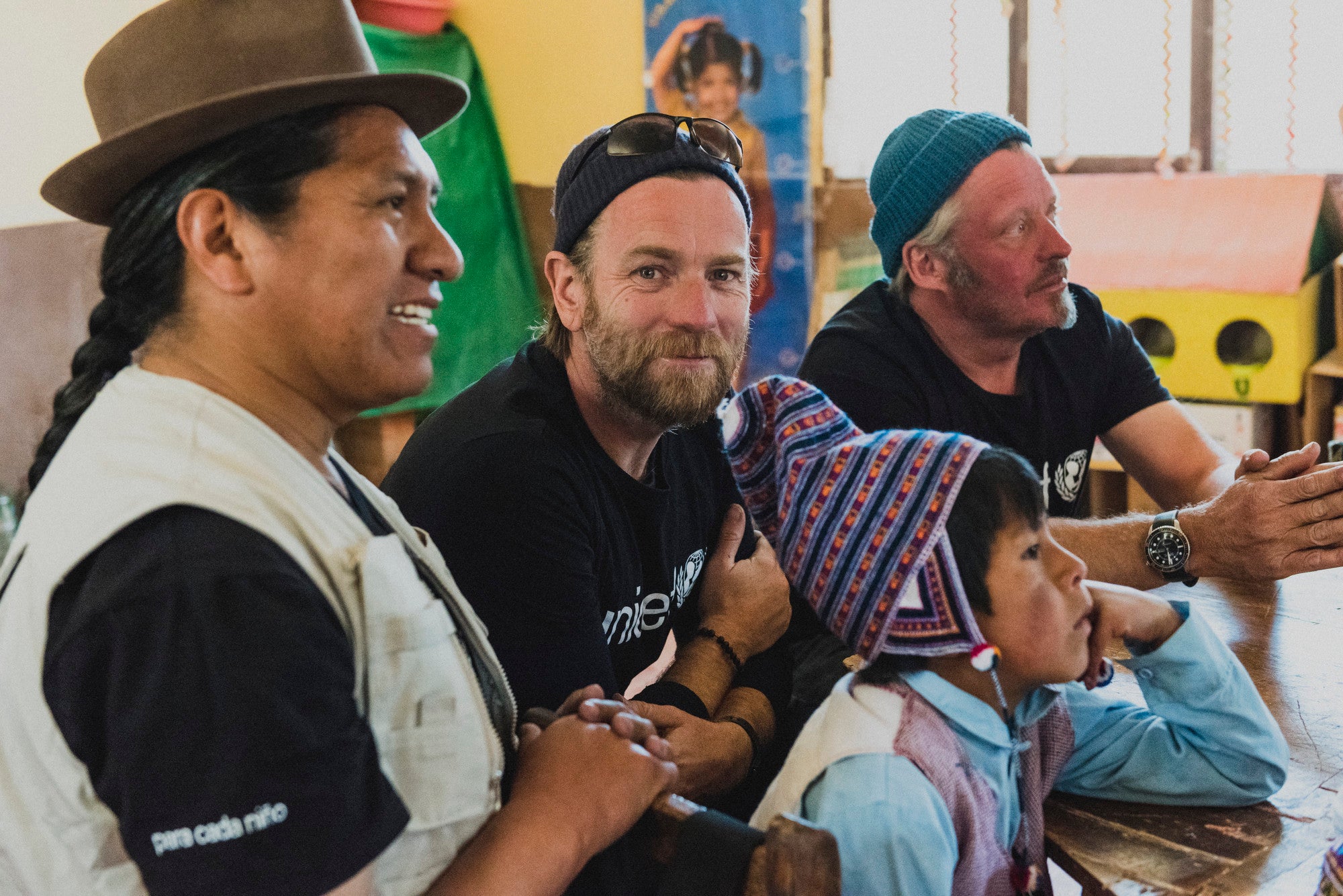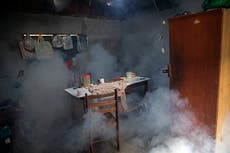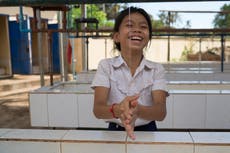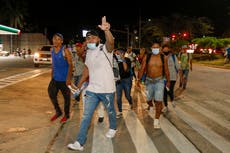The refugee crisis in South America is heartbreaking – children should never have to give up on their future
We have a responsibility to give a platform to the voices of children and families affected by the economic and political turmoil ravaging parts of South and Central America


My life is on hold. I feel hopeless,” Maria said to me, wiping away tears and putting a protective hand around her younger brother’s shoulder.
I met Maria and her brother Abraham last year in a camp set up for Venezuelan refugees on the Peru/Ecuador border. Aged just 16 and 14, the siblings had fled the shocking instability and insecurity of their home country in the hope of a better life in Chile, where they had family waiting.
For months I’d been aware of the refugee crisis unfolding, and as a long standing Unicef ambassador, I’m only too aware that children are usually those hardest hit by these crises. So when my long-time friend Charley and I started planning the third journey in our “Long Way” series, Long Way Up, I knew we had a responsibility to give a platform to the voices of children and families affected by the economic and political turmoil ravaging parts of South and Central America.
It was here that the magnitude of the crisis really hit home for me. Peru receives the second highest number of Venezuelan refugees worldwide after Colombia, though those entering often only need to cross the country to reach Chile. The families we met had left in search of basic supplies, including food and medicine, protection and safety and just simply “a better life for their children”. At the border, families must wait to be granted access to Peru to settle or make their onward journey. Often the wait is gruelling and, frankly, inhumane.
I’ve travelled all over the world seeing Unicef’s work – from Nepal to Iraq – and can say with certainty that nothing ever truly prepares you for what you’re about to see and hear. Nothing prepares you for seeing the fear etched on the faces of parents who just want their children to be safe, happy and healthy.
At this destitute camp, where people sleep on concrete, are lucky to have one meal a day and struggle to escape the blistering midday heat, some families wait for weeks – sometimes months – to receive a resolution: the aspirational stamp of approval – just one stamp from an official that will change their futures forever – but that sometimes does not come at all.
We met many refugees who wanted to share their stories – they didn’t know who Charley and I were, they didn’t want anything from us, they just needed someone to listen. We met young women who had given birth to babies under tarpaulin in the car park after becoming pregnant on the journey. Some of the babies were severely malnourished and Unicef was there to offer support. I ask myself: how would I feel if my teenage daughter was in this camp, in this situation, having left everything behind? It’s heart-breaking. I will always empathise with all parents wanting the best for their children.
Maria and Abraham had already endured the anguish of leaving their terminally ill mother back home, knowing they would likely never see her again. They desperately wanted to get to their father, but had been waiting months for an answer.
It’s a misperception that refugees are anything but heartbroken to have left the home they love. Maria is a talented musician and has dreams of being a singer – etched in my memory is the moment she spontaneously broke into singing well-known anthem Venezuela. She was joined in song by others, tears running down their faces. The raw emotion people felt having left their country out of desperation, missing their homes, not knowing when they’d see loved ones again or if they’d ever make it safely to a new life was palpable.
I also met Raquel – nine years old, full of life, with a wicked sense of humour. She was here with three generations of her family: her mother, grandmother and two younger siblings, one of whom had a physical disability. You’d never know that Raquel herself was severely unwell with hepatitis, relying on medication that was running out. Her mother Gabriella wept as she described her fear for Raquel’s health and her family’s safety. They had been waiting for an answer from the authorities for 50 days.
While families wait, Unicef and their partners have set up an emergency response to help refugee children like Raquel and Maria, have access to water and sanitation, vaccinations and a child-friendly space where they can play and sing – I don’t think I’ll ever forget this brave little girl leading an entire tent of children of all ages in a dance and singalong (and yes, we joined in). In that moment, joy, laughter and childhood innocence prevailed in the midst of a desperate situation. And for older children, there is a teenage-friendly space – particularly important for girls like Maria at risk of sexual violence. “With the support I have here, at least I feel safe,” Maria told us.
Our journey took us through Honduras, until recently the homicide capital of the world, known for its gang violence tearing apart communities and causing mass migration across Central America.
We entered the neighbourhood of Choloma with trepidation, although the gang bosses would have been told we were coming – they like to know who’s on their turf. Generally, they don’t interfere with outsiders if you don’t interfere with them, but those who live locally are not so lucky. As a child here, you’re left with no choice but to grow up quickly, as gangs recruit children as young as five – first acting as lookouts, then messengers, and eventually full gang recruits being forced to extort, smuggle and kill. In a country where four out of five children live in poverty, children are lured with the promise of smartphones, the latest sports labels and gadgets.
We met 17-year-old Jose Manuel. He told us he was a prime gang target – out of school because his parents couldn’t afford it, didn’t have many friends and was often getting into trouble. He knew people involved in gangs and his best friend was killed around two years ago. “It’s a miracle I’ve escaped [joining a gang] so far,” he told us. Instead, he lives in fear – fear of being recruited, losing friends or family members to gang life or losing his own life. “Around here, it’s kill or be killed,” shrugged Jose Manuel.
Many families in the area try to leave to reach the US, Mexico and Guatemala, but many don’t get that far and are sent back, which is almost a bigger threat than staying in the first place, with stigma and apathy aimed at those who try and leave – and a greater risk at suffering violence at the hands of gangs.
We saw how Unicef is present in these communities, helping kids just to be kids and off the streets away from harm. We met teenagers taking part in sport and dance, and they acted out a play for us. For many, acting and drama is a form of self-expression and can help them to process trauma. But importantly, what we also saw was children having fun – there was music, there was colour, there was a lot of laughter.
Of course all of this was before Covid-19 hit and threw their worlds into further chaos. I’ve since learned that the violence in Choloma is worsening due to quarantine, while closed borders mean the opportunity to create a new life away from Honduras is no longer an option. Half a million children were already out of school in Honduras before Covid-19, and this is being exacerbated due to pandemic restrictions – as schools have closed, children’s learning is under threat and they’re at increased risk of violence and harm, as their safe haven is taken away.
Across the region and the world over, children’s education has been put on pause. Last year, we also visited Bolivia and met children at the most amazing and colourful school in the mountains. From indigenous groups, these children were being taught in their native Quechuan tongue and the school was a pillar of the local community, which had sprung up around it, such was the desire of locals for their children to go to school. What struck me most is how much these kids loved to learn. We met some boys who walked up to six hours to get to school – they were absolutely committed to getting an education and had big smiles on their faces as they told us how much they enjoyed all they do in school.
It was really sad to hear that this school has since shut due to Covid, but it is heartening to know that the incredible team at Unicef, along with the school teachers, are working tirelessly to ensure the pupils we met and many others at home can still access a degree of remote learning until the situation settles.
Children should not feel hopeless, but too often they are; they should not have to give up on their future, but too often they have. It’ll always be a great privilege of my life to have met and shared stories with these incredible young people and encountered them in their moments of bravery at a time of despair. It reminds me of our responsibility to them– particularly at this time of global crisis, where children’s lives are upended everywhere.
We all have a role to play in ensuring their rights to learn, play, be healthy and, ultimately, survive are upheld and not forgotten. We all have a role to play in ensuring children can still be children – in conflict, in crises, in the times of Covid and beyond it.
To find out more and join Ewan in supporting Unicef’s work for children, visit unicef.uk/Ewan-Charley




Join our commenting forum
Join thought-provoking conversations, follow other Independent readers and see their replies
Comments